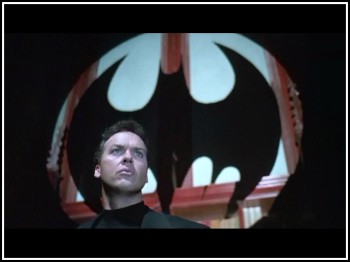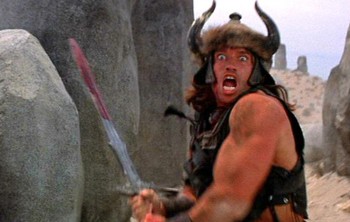Passive vs Active Heroes
Ask any established actor, and s/he will always say something along the lines of, “it’s much more fun to play a villain than a hero.” It’s no wonder: villains tend to get the best lines (“No, Mr. Bond, I expect you to die!”), certainly their share of the trophy companions, have a higher standard of living, enjoy life more, and many go to their eventual demise laughing.
There’s another difference, though, that strikes at the very core of the hero/villain dynamic. The villains get to be pro-active. That means that traditional heroes are always re-acting.
It’s in the nature of heroes to simply sit around and wait to be needed. The most vivid example of that is in Batman Returns, when Bruce Wayne (Michael Keaton) is shown sitting alone in the dark until the bat signal calls to his alter ego. Superman can’t act until Lex Luthor unveils his nefarious plan. Philip Marlowe has to wait for a client to walk in the door.

And this goes against one of the great Rules of Writing, which is to never let your hero be passive. But it’s in the very nature of heroes to be passive, to wait until the villain makes a move, to respond to a threat. After all, how do you act like a hero pro-actively?
Well…ask Conan.

Or any heroic fantasy hero, actually. It’s one of the cornerstones of the genre that heroic fantasy heroes go forth looking for adventure, danger, treasure, whatever they seek.
Perhaps that’s why heroic fantasy, as in many other aspects, doesn’t obey the rules of traditional storytelling. In my last post, I pointed out that it doesn’t follow the traditional Campbellian Hero’s Journey and now I’m saying it doesn’t even follow the rules of popular heroes.
This, to me, is one of the great joys of the genre and differentiates it (in a good way) from more traditional fantasy stories. Frodo has to wait to step up until there’s no one else to take the one ring from Rivendell to Mordor. Katniss doesn’t act until there’s a threat to her sister. Even Tony Stark is content to sit in his tower doing R&D until something requires Iron Man’s appearance. But Conan, and most heroic fantasy protagonists, strides forth looking for trouble, actively seeking the bad guys.
Can you think of any other examples of pro-active heroes?
I just started reading William Morris’ Well at the World’s End and the protagonist, Ralph, seems pretty self-starting — his father sends his three brothers north, east and west and tells Ralph to stay at home and probably take over the kingdom, but Ralph says, “Nope,” saddles up his horse and rides south.
While that illustration of Bruce Wayne waiting for Batman to be called is a strong one and I agree wholeheartedly with your use of it, overall I would argue that Batman is more often much more like Conan and ilk because the Dark Knight is usually found prowling the darkness watching over his city, ready to mix it up and take it to any nefarious-doers he encounters in his questing.
Superman relaxes on the luxury of being able to be/get anywhere almost as soon as he hears of it, so he can wait for things to happen.
As for proactive heroes…Erikson’s Karsa (who is homage to Conan) stands rather tall; Steve Goble’s Calthus comes to mind as well.